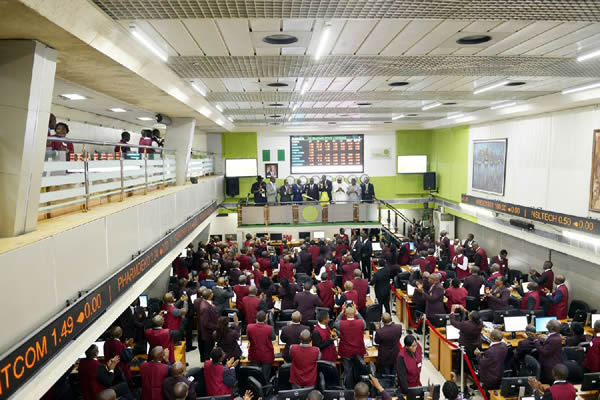
Trading at the stock market remained bearish last week as the Nigerian Stock Exchange (NSE) All-Share Index (ASI) fell further to close lower at 26,536.21.
After four weeks of growth spurred by the Central Bank of Nigeria’s (CBN) monetary policy, the market had declined by 0.54 per cent the previous week. That depreciation resulted from investors’ moves to book in part of the profits that were recorded in the four-week rally.
The negative trend continued last week as more investors sold for cash to meet end-of-year financial commitments among others.
Consequently, the NSE ASI depreciated by 1.19 per cent to close at 26,536.21, while market capitalisation shed N218.2 billion to close at 12.808 trillion.
Losses were recorded on three of five trading sessions of the week. For instance, the first two trading days were bearish as the benchmark index fell 0.7 per cent and 1.1 per cent in that order. On Wednesday and Thursday, buying interest in MTN Nigeria Communications Plc, Guaranty Trust Bank Plc and Nigerian Breweries Plc lifted the market by 0.2 per cent and 0.5 per cent respectively. However, the last day of the week witnessed a decline of 0.1 per cent.
An analysis of the performance by sectors showed that the NSE Banking Index and NSE Industrial Goods Index shed 1.2 per cent apiece. Similarly, the NSE Consumer Goods Index went down by 0.5 per cent. On the other positive side, the NSE Insurance Index and NSE Oil & Gas Index appreciated by 0.03 per cent each.
Commenting on the market performance, analysts at Cordros Capital Limited said given the risk-off sentiment dominating the domestic market, they expect the market to shed points in the coming week, “except we see a policy-driven catalyst. Nevertheless, valuations remain attractive, hence we expect pockets of gains over the final weeks of the year as fund and portfolio managers realign portfolios prior to the start of 2020.”
One issue that dominated the capital market space last week was how the government can fund infrastructure through the market.
Speaking at the 2019 annual workshop of Capital Market Correspondents Association of Nigeria(CAMCAN) market stakeholders concluded that the market was capable of providing the funding needed to bridge the infrastructure gap.
For instance, the acting Director General, Securities and Exchange Commission (SEC), Ms. Mary Uduk said there was no better time than now for the federal and state governments in Nigeria to leverage on the opportunities provided by the capital market for sourcing infrastructure development financing.
Uduk, who was represented by the Head of Department, External Relations, SEC, Mr. Sufian Abdulkarim, said the capital market, “provides an enabling environment for private investments in infrastructure projects and the SEC is doing its part to foster this through the implementation of the Capital Market Master Plan (2015-2025).
“The plan’s major objective is to transform the Nigerian capital market, making it competitive, while contributing towards the nation’s development through funds mobilisation.
“We believe that the establishment of an active infrastructure funds via the capital market as being pursued by capital market stakeholders would be immensely beneficial in closing the infrastructure gaps in the country.
“The international capital markets are the largest and deepest pool of financing in the world, and in conjunction with local capital markets, which represent an essentially untapped source of funds for infrastructure projects, they can make a huge contribution to economic development, if effective transaction structures are developed,” Uduk said.
In the opinion of the Head, Debt Capital Markets, FBNQuest Merchant Bank Limited, Mr. Oluseun Olatidoye, who was the guest speaker at the workshop, the capital market represented a very good platform for raising funding for infrastructure development going by some landmark transactions in recent years because we “have funded over portions of 26 roads across the six geopolitical zones in the country with the sum of N200billion on the FGN Sukuk I and II.”
“We have raised N11.4billion for the development of primary, middle and secondary school facilities in Osun State, we have funded the development of affordable housing on the Mixta Real Estate plc Bond Issues and we have developed a number of roads, bridges, health facilities using the opportunity presented by the capital markets,” he added.
Also speaking, the Chief Executive Officer of the Nigerian Stock Exchange (NSE), Mr. Oscar Onyema, said the recent study by McKinsey stated that Nigeria needs to attract $31 billion investment annually over 10 years for the country to bridge its infrastructure gap. However, the 2019 capital expenditure was about $5 billion, which is clearly insufficient in meeting the infrastructure deficit.
“The investment required is near impossible relative to government resources. Nigeria would require different sources of financing both from traditional and new sources including wider participation of private sector and institutional investors, pension, insurance and leveraging the capital market initiatives. It has therefore become necessary to develop innovative financing solution facilitated by the capital market to bridge,” Onyema, who was represented by the Head, Trading Division, NSE, Mr. Jude Chiemeka said.
Market turnover
Despite the decline recorded by the NSE ASI, the value and volume of trading rose to 1.044 billion shares worth N14.628 billion in 14,974 deals last week, from 952.697 million shares valued at N12.774 billion that were exchanged in 17,279 deals the previous week.
However, the Financial Services industry remained the most traded with 556.905 million shares valued at N5.678 billion traded in 8,267 deals. Thus, the sector contributed 53.33 per cent and 38.81 per cent to the total equity turnover volume and value respectively.
The Healthcare industry followed with 215.030 million shares worth N122.603 million in 412 deals, while the third place was Conglomerates industry with a turnover of 89.601 million shares worth N466.294 million in 874 deals.
Trading in the top three equities namely, Union Diagnostics and Clinical Services Plc, United Bank for Africa Plc and Guaranty Trust Bank Plc accounted for 379.095 million shares worth N3.066 billion in 1,704 deals, contributing 36.3 per cent and 20.96 per cent to the total equity turnover volume and value respectively.
Top price gainers and losers
The price movement chart showed that 44 equities depreciated in price, higher than 35 equities of the previous week, while 18 equities appreciated lower than 19 equities in the previous week.
Chams Plc led the price losers with 18.9 per cent followed Union Diagnostic & Clinical Services Plc with 15.3 per cent. Glaxosmithkline Consumer Nigeria Plc depreciated by 12.5 per cent just as Cutix Plc shed 11.6 per cent.
Daar Communications Plc and Berger Paints Nigeria Plc declined 10 per cent apiece while Arbico Plc shed 9.9 per cent. Other top price losers included: Chellarams Plc (9.7 per cent); Neimeth International Pharmaceuticals Plc(9.5 per cent) and Niger Insurance Plc (9.0 per cent).
On the positive side, Presco Plc led the price gainers with 14.9 per cent trailed by Dangote Sugar Refinery Plc with 10.3 per cent. AXA Mansard Insurance Plc appreciated by 9.9 per cent, just as A.G Leventis Nigeria Plc chalked up 8.3 per cent. Eterna Plc garnered 7.1 per cent, while Cornerstone Insurance Plc and Ekocorp Plc gained 4.7 per cent and 3.7 per cent respectively.
Other top price gainers were:NPF Microfinance Plc (3.6 per cent); UAC of Nigeria Plc (3.4 per cent); and Fidelity Bank Plc (2.9 per cent).


